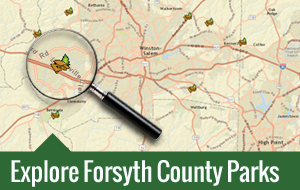The staff at Tanglewood can conduct two staff-guided programs per day. Each program is limited to 28 students for grade school, or 20 students for kindergarten. Programs are designed to last approximately 90 minutes and are conducted outdoors at the park unless inclement weather occurs.
If your school has two programs scheduled for the same day, the first group will participate in a staff-guided program while the second group visits other recreational areas of Tanglewood Park, including picnic areas, playgrounds, restroom facilities and more. A full list of activity options will be mailed when your program is scheduled. The two groups will later switch off.
Grade school programs are correlated with the North Carolina Essential Standards for Science and Social Studies. Listings below show specific correlations in parenthesis.
Forsyth County Parks and Recreation Nature Education staff has been approved as "level 2" chaperones by the Winston-Salem/Forsyth County Schools. A "level 2" unsupervised chaperone is authorized by the district to be with a student away from the direct supervision of a teacher.
Click here to view Registration Information & Fees
For additional information on staff-guided programs, call (336) 703-6439 or email smithpb@forsyth.cc.
| Title | Grade Level | Description |
|---|---|---|
|
Fall Fun (Sept. - Nov.) Spring Out (Mar. - May) |
PreK | Children engage in a variety of seasonal activities that encourage counting, sorting, color and shape recognition and observation of seasonal changes. |
|
Sensory Safari |
Kindergarten (Science: KP1.1, 1.2; KP2.1, 2.2; KE 1.1, 1.2, 1.3; KL1.2) (Social Studies: KH1.2; KG1.3, 2.1, 2.2) |
Students use their senses to describe physical properties of the natural world, including observable changes in the weather and seasons. A nature walk includes examinations of physical features along the trail, emphasizing interactions between humans and the environment. Students also compare characteristics of some of the wild animals that live at Tanglewood Park. |
| Animal Signs |
Grade One (Science: 1L1.1, 1.2, 1.3; 1L2.1, 2.2) Studies: 1G2.1; 1C & G1.2) |
By following a trail of animal signs, students learn about habitat components and how various park environments meet the basic needs of different plants and animals. They also learn ways people can change and/or protect the environment for the continued survival of organisms. The roles that park rangers, land managers and game wardens play in protecting habitats are emphasized while presenting these jobs as potential career options. |
|
Nature’s Orchestra and Cycles
of Life |
Grade Two (Science: 2P1.1, 1.2; 2L1.1, 1.2; 2L2.1, 2.2) (Social Studies: 2H1.1, 2G2.2, 2C & G1.1) |
This program compares and contrasts lifecycles of various animals that live at Tanglewood Park with an emphasis on growth, development and reproduction. Highlighting the role that government parks such as Tanglewood play in Monarch conservation, students will construct a timeline to show the sequence of events in the lifecycle and annual migration of this butterfly. Along the nature trail, students will visit “communication stations” to replicate various types of sound production that certain insects use to locate potential mates. |
|
TreeMendous Trees |
Grade Three (Science: 3L2.1, 2.2, 2.3, 2.4) (Studies: 3G1.3; 3E1.2; 3C&G2.2) |
This program relates how Piedmont environmental conditions such as soil type and climate favor the growth of a wide diversity of trees that benefit wildlife and people, as well as influence economic development. A nature walk will incorporate identification of some common Tanglewood trees while emphasizing sustainable harvest practices for a wide variety of tree products. The lifecycles of selected trees are summarized along with the function of common plant structures. |
|
Piedmont Native Americans |
Grade Four (Science: 4E1.2; 4L1.3) (Social Studies: 4H1.1, 1.3; 4G1.2, 1.3, 1.4) |
This program introduces students to the “Woodland” Native Americans that once inhabited
Pre-Columbian North Carolina and ways their culture and community placement changed
after European exploration and settlement. Students learn how the availability of
natural resources and knowledge of natural events such as moon phases played a crucial
role in Native American survival, technology and customs. Emphasis is placed on ways in which native cultures interacted with and sometimes modified their environment to ensure their continued existence and how modern-day humans continue to adapt their own behaviors to live in changing habitats. |
| Tanglewood Ecosystmes: Lake and Pond |
Grade Five (Science: 5P2.1; 5L2.1, 2.2, 2.3) (Social Studies: 5G1.2) |
Tanglewood Park hosts a variety of ecosystems. This program allows groups to investigate a lake/pond ecosystem by classifying the resident organisms according to the biotic functions they serve within the ecosystem and the interconnected relationships they share. Students also investigate the role of the water cycle in maintaining lakes and ponds, with an emphasis on the negative effects of human activity on lake/pond ecosystems through nonpoint source (NPS) pollution. Students take on the role of “raindrops” to learn ways in which NPS pollution can be prevented. |
| Classroom in the Creek |
Grade Eight (Science: 8.E.1.1-1.3; 8.L.3.1-3.2 |
Classroom in the Creek allows a hands-on approach to determining stream quality by allowing students to collect and observe aquatic macro-invertebrates. Participants will identify the organisms collected and learn about their role in the food chain. Using data collected onsite, a simple mathematical formula will allow students to obtain a water quality rating for the stream sampled. Students will also learn about water distribution and how streams and stream quality impact local river basins. Please note, this program is limited to groups of 15 or less per program The Nature Education Division can conduct 2 programs per day. |
* From N.C. Standard Course of Study for Social Studies
















